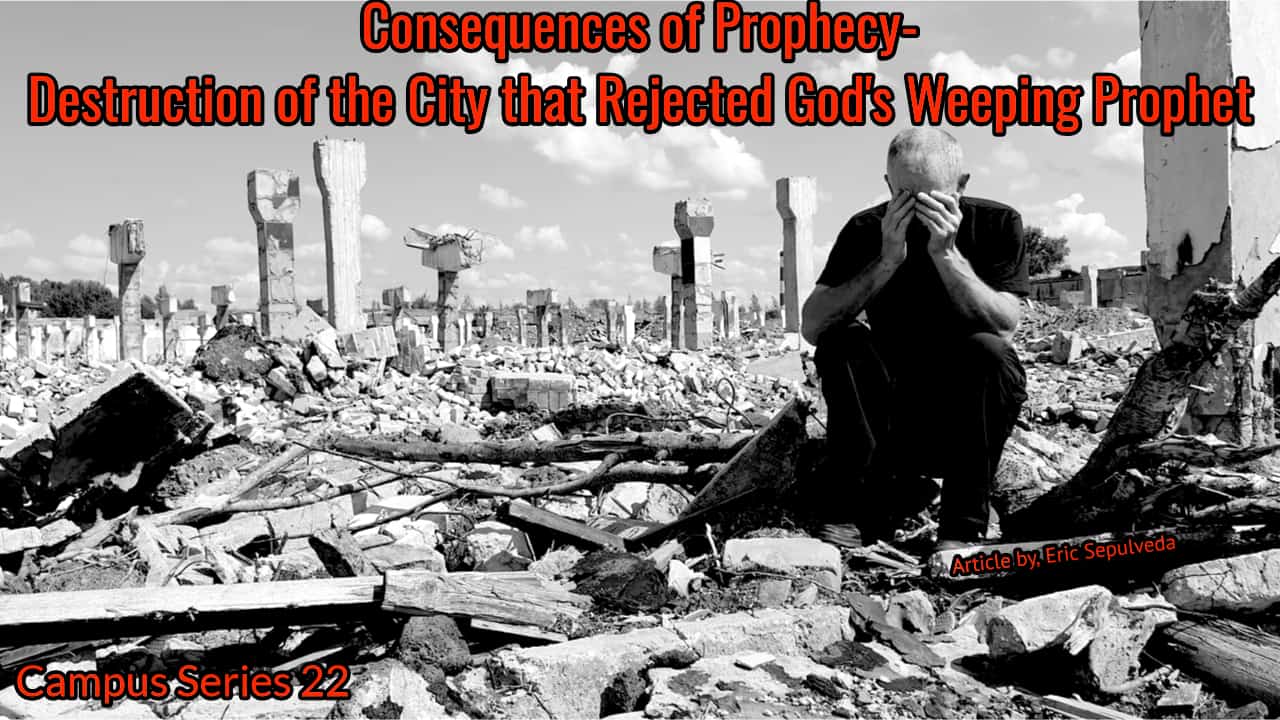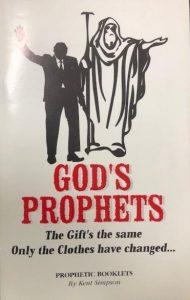
The Consequences of Prophecy-
Destruction of the Nation that Rejected God’s Weeping Prophet
The Book of Lamentations is a collection of dirges (funeral songs) that Prophet Jeremiah wrote after the siege of Jerusalem, demolition of Solomon’s Temple, and exile of the Israelites to Babylon. While Jeremiah, known as the Weeping Prophet, poetically describes the terror and devastation that the city was experiencing, the people had had many opportunities to prevent the horror in which they had become engulfed. Despite being a people, city, and nation supposedly dedicated to God, they did not heed the symbolic warnings that His Prophets gave to turn away from their sinful practices. More importantly, the rejection of God’s Messengers and Prophets was seen as a rejection of God Himself.
Jeremiah, later known as the Weeping Prophet, conducted many prophetic performances to help demonstrate the need for Israel to turn away from their idolatry and the consequences of refusing to do so.
Perhaps Jeremiah’s most famous prophetic act concerned the wearing of a linen girdle and traveling to Perath (near the Euphrates River) where he was to hide the girdle in a hole in a rock. Jeremiah would have traveled some 350 miles each way from Jerusalem and back, only to be asked much later to by God to go back and retrieve it. When Jeremiah returned to where he had hidden the linen garment, he found that it was marred and because it was organic, had begun to decompose and was no longer useful for anything.
God explained to Jeremiah the prophetic significance of this now worthless belt. When Israel and Judah were closely and intimately bound to God, they served a purpose and were given renown, praise, and honor, but because of their unfaithfulness serving other gods, they had become rotten and useless. Ultimately, they would be taken out of their homeland and placed in this rocky region for a set period in during their exile (ref. Jeremiah 13: 1-11)
But because God is merciful, He ensured that those who turned back towards Him would be considered and spared.
God led Jeremiah to a potter’s studio where the artisan was shaping a piece of clay. While Jeremiah watched the potter working at his wheel, the soft clay pot he was fashioning became disfigured and distorted. Because the clay was still flexible, the potter was still able to save the clay and reshape it into a new vessel.
Explaining this prophetic sign, He declared that just as the potter is able to reshape the clay in his hands, God would shape and mold those whose hearts were still malleable and willing to turn back to Him. In comparison to the soft clay that would be taken gently in God’s Hands, the stiff necked and the hard hearted would be like a clay vessel that had already been baked in a kiln and no longer able to be molded (ref. Jeremiah 18:1-10).
God instructed Jeremiah to purchase a clay jar from a potter and to bring elders and priests with him to the Dung Gate and to prophesy the coming destruction that was about to befall the city. Because they had filled the land with the blood of the innocent, through their sacrificing of children to their false idols, God was going to bring about a great slaughter. The carcasses of the inhabitants of the city would be food for wild animals, the city would become desolate, and the besiegement of the city would be so great that they would be forced to eat their sons and daughters and eventually kill and eat each other.
After announcing such a horrific sentence on the city and its leaders, Jeremiah smashed the jar in front of the congregation. The prophetic performance was to clearly let them know that the Lord was planning on smashing stiff-necked and hard hearted Israel and Jerusalem so it could no longer be repaired just like the clay jar (ref. Jeremiah 19).
Though Jeremiah’s position as prophet had him mostly focused on Judah, God’s had him deliver a message to the surrounding kingdoms through their emissaries who were visiting the capital. Jeremiah was told to make a yoke out of straps and crossbars and wear it on his neck like a draught animal and in the presence of King of Judah Zedekiah and the neighboring kingdoms’ envoys declare that they must all bow before Nebuchadnezzar King of Babylon and be subject to him. If they would not humble themselves and place the symbolic yoke upon their necks and become vassal states, they would be destroyed.
Jeremiah not only performed this prophetic display for the King of Judah and his diplomatic guests, but also warned them not to listen to the false prophets who would try to deceive them saying that they would not have to be subjects to King Nebuchadnezzar. God was clear that any who went against this word were not sent from Him. Only the kings who bowed their neck under the yoke would be spared (ref. Jeremiah 27)
While the Book of Lamentations is filled with songs of grief and resentment for the destruction of Jerusalem and the Babylonian Exile, God revealed to The Weeping Prophet what was to happen if they did not turn their hearts back to Him quickly. Both in private and public settings, God used Prophetic Presentations and Performances to help strengthen His Word to His People. But despite these warnings to Judah’s elites and leadership, they continued to ignore the warnings that Prophet Jeremiah brought them and their people, city, and nation suffered accordingly. Great churches, communities, and nations will be brought to their knees if they do not heed the word of God’s Messengers and Prophets.
Prepared by, Kent Simpson, Apostolic Prophet & Eric Sepulveda, PMT Administrator
For more prophetic media groups click here


